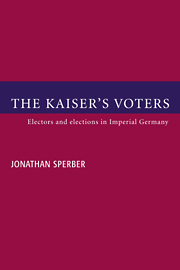5 - The Wilhelmine elections
Published online by Cambridge University Press: 22 October 2009
Summary
The elections of the 1890s
In Bismarckian Germany, elections had centered on the clash between oppositional and governmental parties. There were certainly other issues involved in the campaigns – the exercise of religion, taxes, tariffs, and social insurance, to name just a few – but they were brought to the voters' attention by governmental initiatives and discussed in the context of support for or opposition to them. The 1887 elections marked both the climax of these government-made elections and their end. In the general elections held between 1890 and 1912 the campaigns of the political parties and the initiatives of the government increasingly diverged; a strong polarization between governmental and oppositional parties determined the dynamics of just one general election, that of 1907.
It was not that the national government no longer had the intent of determining or at least influencing the nature and outcome of the Reichstag elections. After 1890, just as before, the authorities continued to provide useful information for the press and other campaign print media; to sift through the candidates, ascertaining which were deserving of official support; to implement or broker negotiations between different political parties in specific constituencies in order to ensure that the best candidate from the government's point of view could be elected; and to offer subsidies from secret discretionary funds to individual candidates or political parties. However, if the state officials of Wilhelmine Germany were trying to run elections as they had done in Bismarck's day, they were having rather less success.
- Type
- Chapter
- Information
- The Kaiser's VotersElectors and Elections in Imperial Germany, pp. 203 - 264Publisher: Cambridge University PressPrint publication year: 1997



